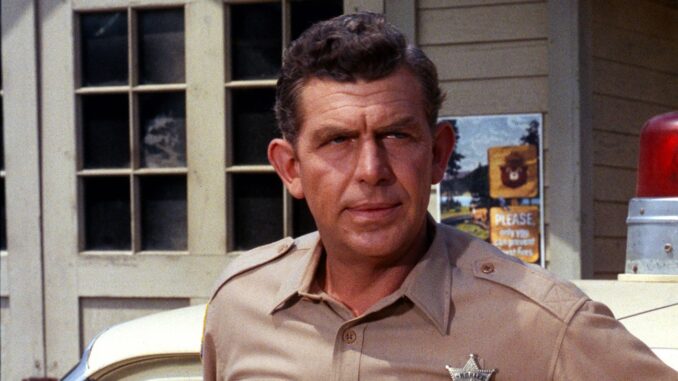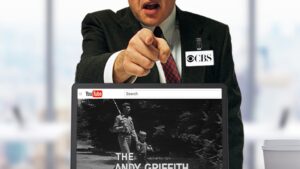
The Lawsuit That Shocked Mayberry Fans
If you thought Mayberry was just a quiet, fictional town full of porch-sitting and whistling, think again. CBS, the media giant behind The Andy Griffith Show, has filed a lawsuit against a YouTuber for uploading full episodes of the iconic sitcom. This isn’t just about protecting a 1960s TV show—it’s about setting boundaries in the digital world.
Who Is the YouTuber and What Did They Post?
Though CBS hasn’t named the YouTuber in their initial press release, online detectives quickly found the channel in question. This creator had built a modest following by uploading full episodes of The Andy Griffith Show—a nostalgic treasure for millions.
Their content attracted fans of all ages, especially those who grew up watching the show or discovered it later through reruns. But what started as a passion project turned into a legal nightmare.
CBS’s Official Stance on the Lawsuit
CBS didn’t mince words. In a statement, the network emphasized that “unauthorized reproduction and distribution of copyrighted materials will not be tolerated.” According to CBS, the YouTuber did not have permission to share, stream, or reproduce episodes of The Andy Griffith Show, which remains under their exclusive copyright.
They argued that allowing such uploads without consequences could jeopardize their licensing deals and streaming rights agreements.
Copyright Laws and Classic TV: A Quick Breakdown
You might wonder, “Isn’t The Andy Griffith Show old enough to be public domain by now?” Actually, no. While many think classic TV falls into the public domain, most shows are still very much protected under modern copyright law.
Generally, works created after 1978 are protected for the life of the author plus 70 years. For corporate-owned content like The Andy Griffith Show, copyright can last up to 95 years from publication. That means CBS still controls it—lock, stock, and Mayberry.
Why Classic Shows Still Have Legal Protection
CBS—and other media conglomerates—invested heavily in digitizing, restoring, and streaming vintage content. Whether it’s through Paramount+, MeTV, or syndication packages, old shows still generate real revenue.
In legal terms, it doesn’t matter how old the material is if it’s still under copyright. Think of it like this: owning a vintage car doesn’t mean you can duplicate and sell it. CBS still owns the keys.

How Copyright Strikes Work on YouTube
YouTube creators live in a world governed by the DMCA (Digital Millennium Copyright Act). When someone posts copyrighted content without permission, companies can issue a takedown notice—or worse, sue for damages.
CBS likely followed the usual process: issued strikes, requested takedowns, and eventually escalated when the YouTuber didn’t comply. If a creator receives three strikes, YouTube can terminate their channel permanently.
The Value of Intellectual Property in the Streaming Era
Old shows like The Andy Griffith Show aren’t just historical artifacts. They’re digital assets that bring in viewers, subscriptions, and syndication cash.
CBS isn’t suing just to make a point—they’re protecting one of their golden geese. Every upload of a full episode potentially diverts viewers from platforms CBS controls and monetizes.
Can Fans Share Their Favorite Shows Online Legally?
Technically? No. Not full episodes, anyway. Sharing short clips for commentary, reviews, or parody might fall under fair use, but full episodes cross the legal line.
Even if you’re not making money off it, you’re still distributing copyrighted content. And that opens the door to lawsuits like this one.
The Slippery Slope of Nostalgia and Piracy
We’re in a tricky spot as a culture. We love to relive the past, and platforms like YouTube give us an easy way to do it. But nostalgia doesn’t override copyright law.
What seems like harmless sharing to one fan might be viewed as revenue theft by the rights holder. And in the court of law, the latter usually wins.
What the YouTube Community Is Saying
The YouTube community has split into camps. Some argue CBS is crushing a harmless fan who just wanted to celebrate a beloved show. Others say the YouTuber should’ve known better—especially since uploading copyrighted TV episodes has always been a risky move.
Creators are watching this case closely. It could set a precedent for how companies deal with fan-made uploads in the future.
The History of Legal Battles Over Classic Content
CBS isn’t the first to take a YouTuber to court over old TV episodes. Warner Bros. and NBCUniversal have both taken similar actions in the past. Even independent creators have sued over unauthorized uploads.
Classic content may be vintage, but the laws that protect it are anything but old-fashioned.
Fan Reactions: Outrage, Support, and Everything In Between
Fans are understandably upset. For many, The Andy Griffith Show is more than entertainment—it’s comfort food. The idea that someone sharing those episodes could be sued feels harsh.
But some fans also understand CBS’s perspective. They argue that there’s a right way to enjoy old content—through official streaming or purchasing licensed DVDs.
Does This Mean the End of Classic TV Clips Online?
Not necessarily. You can still find clips, behind-the-scenes footage, and commentary videos legally shared online. The issue arises when full episodes are uploaded without proper rights.
CBS isn’t banning all content. They’re just drawing the line at outright redistribution.
CBS vs. Creators: A Growing Trend?
This lawsuit is part of a bigger conversation. Media companies are tightening control over their content while creators continue pushing the boundaries of what’s shareable.
As streaming services become more competitive, rights holders are less willing to tolerate what they see as piracy—no matter how innocent the intention.
What Happens Next in the Case?
If CBS wins—and legally, they have a strong case—it could mean fines, a court order to remove content, and possibly channel termination. The YouTuber could also face financial damages if the court decides CBS lost revenue.
The bigger question? Will other fans follow suit and take down content voluntarily, or will more lawsuits pop up?
Conclusion: A Legal Wake-Up Call for TV Nostalgia
This CBS lawsuit isn’t just about The Andy Griffith Show—it’s about how we treat content in the digital age. Fans may love old shows, but loving something doesn’t give you the right to copy and distribute it.
Whether you’re a nostalgic viewer or a content creator, this case reminds us that copyright still matters—even when it comes to black-and-white sitcoms from the 1960s. If you want to share, make sure it’s legal. Because in the eyes of CBS, Mayberry may be friendly—but copyright infringement isn’t.
FAQs
1. Can I upload clips from ‘The Andy Griffith Show’ for commentary or reaction videos?
Yes, but only under fair use guidelines—meaning short clips used for critique, commentary, or parody. Full episodes? That’s a no-go.
2. Is ‘The Andy Griffith Show’ in the public domain?
No. Despite its age, CBS still holds the copyright. Most content from the 1960s won’t enter the public domain until decades from now.
3. What penalties can a YouTuber face in a copyright lawsuit?
Penalties can include financial damages, content removal, and permanent account termination. Courts may award statutory damages even if no profit was made.
4. Where can I legally watch ‘The Andy Griffith Show’?
You can stream it on platforms like Paramount+, or purchase it on DVD and digital services like Amazon Prime Video and iTunes.
5. Does this lawsuit mean YouTube will ban classic TV content?
Not at all. But it does mean creators need to be cautious. Posting entire episodes without permission can result in serious legal consequences.